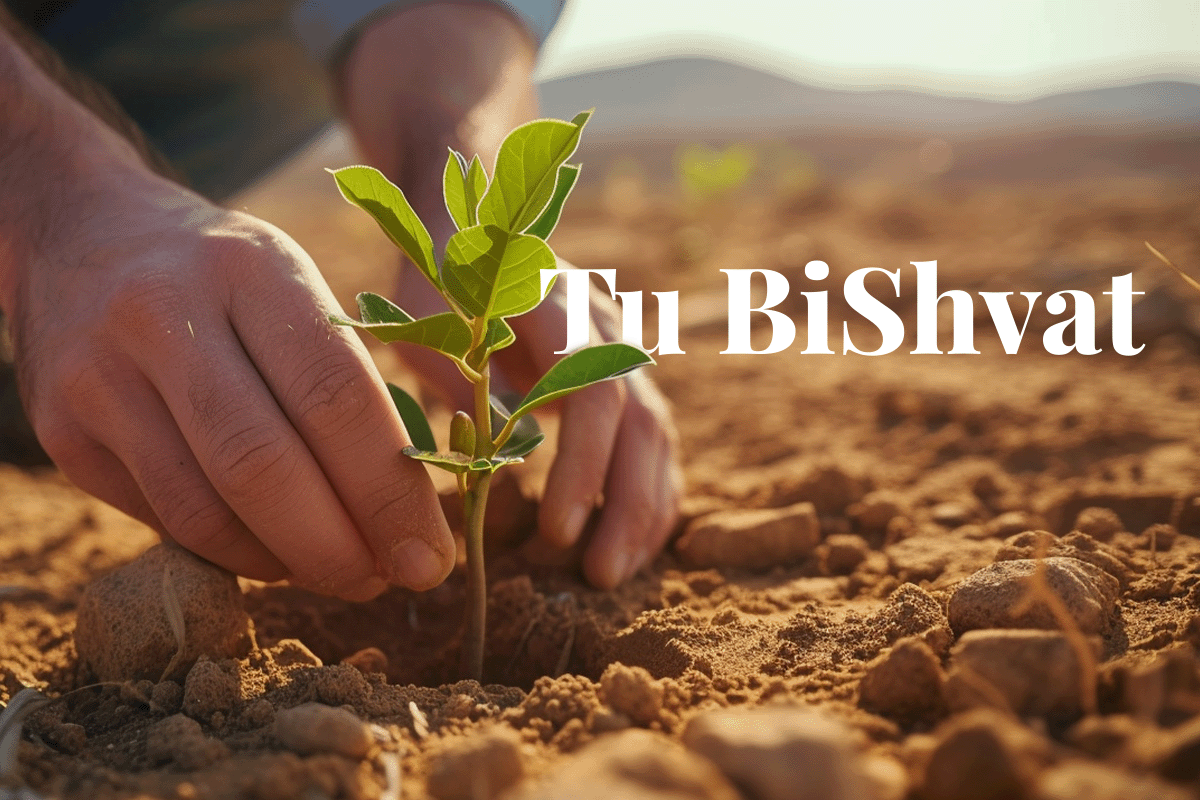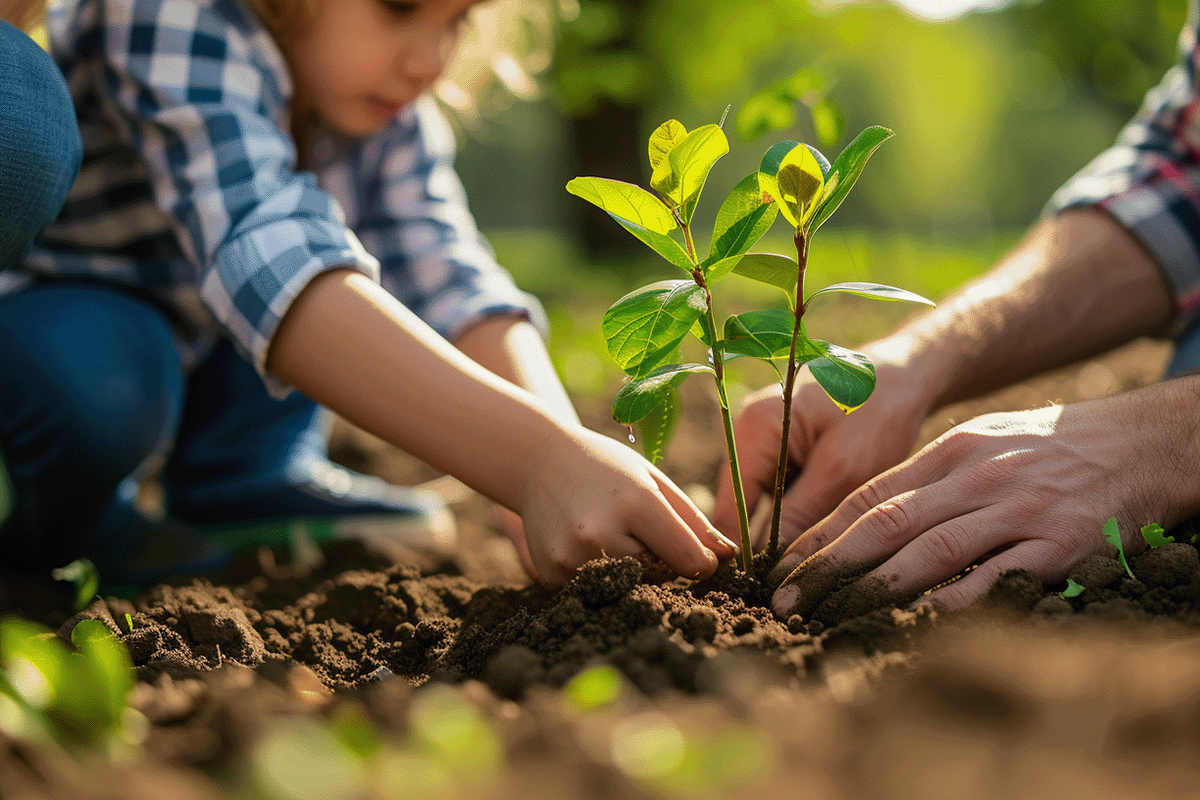Tu BiShvat, the holiday known as the ‘New Year for Trees’, is a time-honoured celebration of nature's renewal and the vital role trees play in our ecosystem. This festival, rooted in biblical times, has evolved over centuries and holds both agricultural and spiritual significance. In modern times, it's become a symbol of environmental awareness and a celebration of nature's renewal and sustenance.
 Close-up of a man planting a tree in a desert area. AI generated picture.
Close-up of a man planting a tree in a desert area. AI generated picture.
The festival's deep-rooted connection to trees and the environment makes it an ideal moment to focus on reforestation and conservation efforts. In this spirit, DGB Group's mission aligns perfectly with the essence of Tu BiShvat, as we engage in nature-based solutions emphasising ecosystem restoration and conservation.
Historical origins
Tu BiShvat originates in ancient Jewish law. In the Mishnah, Judaism's written oral tradition, Tu BiShvat was established as the cut-off date for calculating the age of fruit trees. This was crucial for adhering to biblical laws like orlah (forbidding eating the fruit of new trees for three years) and maaser (tithing). Thus, Tu BiShvat became a pivotal date in the agricultural calendar.
Beyond its agricultural roots, Tu BiShvat has a deep spiritual and ecological resonance. In Jewish mysticism, this day symbolises the strength and renewal of nature, reflecting themes of growth, renewal, and ecological awareness. It encourages a reconnection with the Earth and an appreciation for the natural world.
Modern celebrations
Today, Tu BiShvat is celebrated in various ways. In Israel, it's marked by planting trees and holding outdoor festivities. Jewish communities around the world observe it by eating fruits associated with the Holy Land, particularly the seven species mentioned in the Torah: wheat, barley, grapes, figs, pomegranates, olives, and dates.
Environmental education is also a significant aspect of modern Tu BiShvat. Many use this day to advocate for ecological responsibility and sustainability, reflecting on how our actions impact the planet.
Many Jewish schools and organisations use Tu BiShvat as a platform to educate about environmental issues. Activities include tree planting, nature walks, and discussions about sustainability from a Jewish perspective. This aspect of the holiday fosters a sense of responsibility towards the Earth.
Read more: Reforestation: 10 amazing benefits of planting trees
A call for environmental stewardship
Tu BiShvat reminds us of our duty to care for the environment. In the context of global ecological challenges, this day becomes a call to action for conservation, sustainability, and awareness of our impact on the natural world.
Trees hold deep symbolism in Jewish thought, often representing life, growth, and prosperity. Tu BiShvat reinforces this symbolism, reminding us of trees' vital role in sustaining life and the importance of nurturing our environment.
Learn more about your environmental impact
The relevance of Tu BiShvat today
In a world facing environmental crises, Tu BiShvat's message is more relevant than ever. It's a day to celebrate nature, reflect on our relationship with the Earth, and commit to environmental stewardship. Whether through planting trees or educating about sustainability, Tu BiShvat offers a meaningful opportunity to reconnect with nature and renew our commitment to its care.
Celebrate by planting trees with DGB
This festival, rich in history and meaning, invites us to look at the natural world with appreciation and responsibility, reminding us that our actions today shape the world of tomorrow. Tu BiShvat is a symbol of our interconnectedness with nature and a call to preserve it for future generations.
 Close-up of a family planting a tree in a park. AI generated picture.
Close-up of a family planting a tree in a park. AI generated picture.
Tu BiShvat and DGB Group’s shared vision
Tu BiShvat's message of growth, renewal, and ecological responsibility aligns seamlessly with DGB's mission. As we celebrate this festival, we are reminded of the importance of our ongoing efforts in ecosystem restoration and conservation. DGB's commitment to nature-based solutions and tree-planting initiatives not only honours the spirit of Tu BiShvat but also drives meaningful change in our world. This holiday, let us renew our commitment to the environment, embracing our role in nurturing and protecting our planet.
At DGB, we are committed to restoring and conserving natural habitats. Our purpose-driven project development focuses on managing high-quality projects that prioritise ecosystem restoration, conservation, and biodiversity enrichment. Through our projects, we plant millions of trees that help restore forests and provide socio-economic benefits to local communities.
Our work extends beyond physical reforestation. At DGB, we help companies understand and commit to environmental improvement. We assess environmental footprints, develop strategies for environmental solutions, and help communicate progress on sustainability transparently.
Start your green journey today by calculating your environmental footprint




